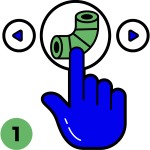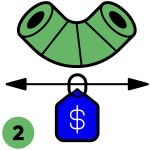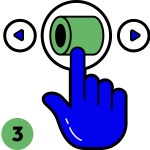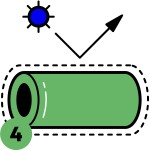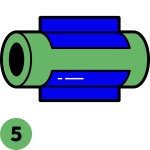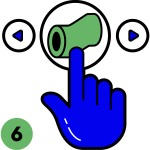
|
|
| ||||||||||||||||||||||||||||||
| "If there be any among us who [disagree], let them stand undisturbed as monuments of the safety with which error of opinion may be tolerated, where reason is left free to combat it." Thomas Jefferson, March 4, 1801 |
Clear PVC Pipe & Acrylic Tube |
Sch 40 White PVC Plumbing Pipe |
Sch 80 Gray PVC Plumbing Pipe |
Furniture Grade Glossy White Pipe |
PVC CTS CPVC Pipe |
Thinwall PVC Pipe |
Metric PVC Pipe |
by Eric, Technical Support for FlexPVC.com a division of PVC Distributors LLC, Pahrump, Nevada
Phthalates & PVC
What are Phthalates, are they dangerous and is PVC the hidden poison in your home?
All of our flexible PVC products contain a plasticizer called Di-isononyl Phthalate (or DINP). This information does not apply to rigid pvc pipe, nor any pvc fittings we sell. It only applies to the vinyl and flexible pvc pipe and hoses.Several years ago, there was a great deal of scrutiny on a plasticizer called Di-octyl Phthalate (or DOP). DOP was one of the most commonly-used plasticizers for decades, but was linked in some studies to various health risks. Some lab rats exposed to high levels of DOP as juveniles exhibited stunted organ growth, obesity and heart problems as adults.
This led to a lot of bad publicity that resulted in DOP (Sometimes also called DEHP) being banned in many parts of Europe and the USA. It also made the word "Phthalate" a popular "danger word" amongst many consumer groups.
"Phthalates" actually refers to a whole family of chemical compounds. There are many that are demanding that all phthalates be banned. For what it's worth, our plasticizer (DINP) is considered one of the most benign, and is commonly used in food-handling and baby products.
As for "off gassing" or "leaching" that too became a popular concern in the media a few years back and is just a fancy term for "evaporation." All plasticizes will eventually evaporate out of the PVC leaving it stiff and brittle. This is why you get that cloudy film on the inside of your car's windshield. It is from the plasticizers evaporating from the vinyl dashboards, trim and seals in your car. But when it comes to flexible pvc pipe, where does it "evaporate" to? Not the water. That's a higher pressure zone. They come out into the air. I suppose if the plasticizer we used was the dangerous one and if you stuck your head under the tank and breathed it for months on end.... it might have a health risk... maybe. But we don't use DOP or DEHP and you don't live under your tank, and the fish don't "breath" it because it goes from the hose/pipe to the atmosphere not the water. :-) DINP is highly soluble in fats, so it's not a good idea to use any flexible pvc pipe for the transfer of any type of fats that are to be used for human or animal consumption.
In short, unless someone is eating PVC by the pound, the actual exposure to anything "dangerous" from our PVC products would be about the same as an average person experiences handling plastic products through the course of the day (holding a phone, typing on a keyboard, eating with plastic utensils, drinking through a plastic straw, etc.)
IMPORTANT NOTE: There are many places on the net selling flexible pvc pipe sometimes referring to it as "flexpvc" (our registered trademark for our website FlexPVC.com.) If another company is claiming they are selling "flexpvc" or "pvc flex" or anything like that and it's made in MEXICO, China and other none US, non-UK locations, you can 100% be assured it's not the same "flexpvc" as the flexible pvc pipe we sell at FlexPVC.com. Since DOP has not been banned from those other locations and since it's cheaper to use then the other plasticizers, you would be wise to exercise caution when buying flexible pvc pipe from places other than FlexPVC.com
As always all we can do is offer the best information available and let the customer decide. :)
I hope you found this informative.
Eric
FlexPVC.com
All Rights Reserved PVC Distributors LLC
Additional Information:
The US EPA says "DINP has not been shown to cause the 'phthalate syndrome' "
NICNAS (Australia) does NOT list DINP as a Hazardous substance and has no restrictions on it's use.
The European Union classifies them as not “dangerous to the environment or human health. (And not very soluble in water.)
The only information on DINP we could find indicated that it would be a health risk if you eat it. So don't eat any of the flexible pvc pipe you buy from us. Don't spit in the wind, don't pull the mask off the ol' Long Ranger and don't mess around with Jim. ;-)
And as always, California says it causes cancer. [Note: California also says "saw dust" causes cancer, so just keep that in mind.]
|
Home Contact SIGN UP FOR OUR EMAIL LIST - for free gifts every month, discount codes and product announcements. |
FAQ Application Guidelines Technical Articles Technical References Technical Videos Prop 65 Warning |
Privacy Statement Terms & Conditions Warranty Disclaimer Shortcuts Shopping Cart Sitemap |
Our Charities & other important issues. Plumbing & Irrigation Directory Location:216.73.216.125 Links Blog KeyCDN and Bunny.NET work well. |
| All text, images, layout and design Copyright 2002 - 2025 FlexPVC ®, PVC Distributors LLC. - - - FlexPVC ® is a Registered Trademark of PVC Distributors LLC | |||



